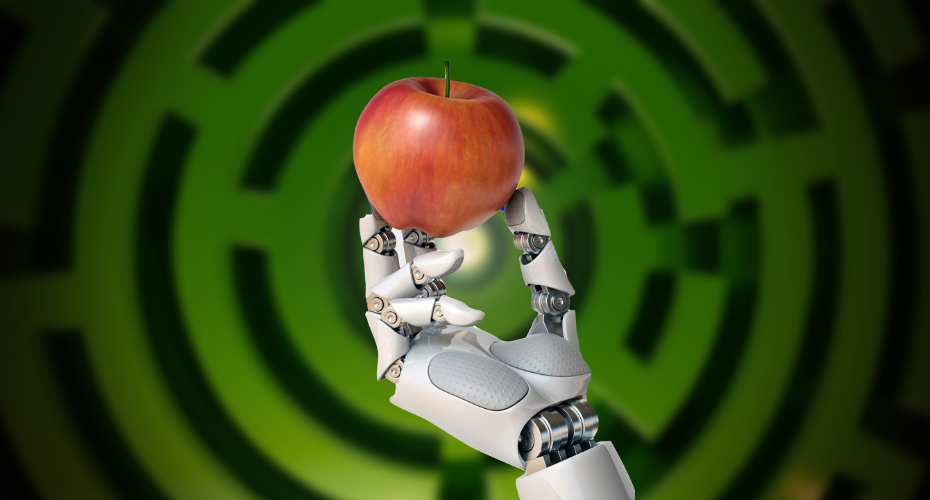Nowadays, technology is advancing at an astonishing rate and is becoming an integral part of human life. One such emerging technology is Artificial Intelligence (AI). It makes a machine into a computer-controlled robot that mimics the actions of a human. AI gathers a large amount of data and analyses it. Later it interprets the huge quantity of data in a short period. A human would not be able to manage this. This is a continuous process where the more data it collects, the precise the interpretation will be. This human like machine aims at boosting the efficiency and the productivity of every sector it enters into. Hence, the use of artificial intelligence in various industries is gaining a lot of popularity and the food industry is no exception.
AI is playing a great role in reshaping the food industry in various ways. From waste management, supply chain management to developing new products, it is a game-changer. One of the main effects of AI is the reduction in time and resources and thereby increasing the profits of the companies.
Let us discuss the use of artificial intelligence in the food processing industry and how efficient and effective they are in reshaping the food sector.
Artificial Intelligence in the food industry can be used in the following fields…
1. Sorting of products
The most time consuming and challenging process in the food industry is the sorting of the fresh produce. As the size of every fruit or vegetable is different, it needs a unique sorting technique that not only consumes less time and reduces manual labour but also delivers and maintains the good quality of the produce. For example, sorting of tomatoes based on the colour will not only help in removing the off-colour tomatoes which will increase the acceptability by the consumers but also remove any foreign matter present in the lot.
TOMRA is a company that develops sensor-based solutions for optimal resource productivity. They use different types of technologies such as NIR (near-infrared) spectroscopy, cameras, X-ray, lasers, etc to analyze various angles of the fruit or vegetable for sorting. This is not only less time consuming but also improves the yields of the product with better quality and minimum wastage.

2. Developing new products
Developing new and unique products is a very crucial aspect of every successful company. But it can be quite challenging to know and deliver what the consumers want exactly. With the already existing products, it is difficult to create a new flavour that would satisfy the customers. AI helps in collecting a large amount of data of the consumers’ preferences and analyses them to create new flavours and recipes to match the requirements of the target audience
3. Cleaning Processing Equipment
In food factories, cleaning of the equipment is a huge responsibility. It is an automated process that involves no manual labour but there is a risk of contamination of the machinery. Moreover, it is long a process that consumes time and requires a lot of resources such as water.
The University of Nottingham states that cleaning accounts for 30% of energy and water use. Therefore, the researchers claim that the system they are building will reduce the cleaning time and resources by 20% – 40%. They call this system Self – Optimizing – Clean – In – Place (SOCIP) which involves the use of AI. It contains ultrasonic and optical sensors which analyzes how much microbial debris and food residue is left inside the equipment. Since the equipment that is currently in use does not contain any sensor, it cannot detect any such contamination inside the machinery or the device.
4. Supply Chain Management
Managing the supply chain is one of the topmost priorities of the food industries. Since the food regulations are becoming more strict and the need for transparency with their operations is also increasing. AI helps in improving the supply chain by conducting food safety tests and monitoring the product at every single stage of the supply chain. To maintain transparency, they track the products from farm to folk very diligently. Moreover, AI also assists in generating accurate forecasts to manage inventory and pricing of the products.
5. Ensuring personal hygiene
When it comes to food safety, good personal hygiene becomes a necessity in every food plant. AI-based cameras come in handy in monitoring the personal hygiene of all the employees working in the plant. These types of cameras can detect whether the employee is following the hygiene guidelines. They use facial – recognition and object – recognition to find out if the workers are wearing masks and hats according to the food safety rules. If there is any violation of the code of conduct, then it draws out the image and reviews it.
Artificial Intelligence is becoming a very important and useful aspect in the food sector despite being at its primary phase. Due to its capability of handling wastage of food along with the maintenance of the equipment and increasing the personal hygiene of the workers, it has become a necessity in most of the food companies. In the coming years, AI is going to change the food processing and handling sector. It is likely to establish an affordable and improved industry for both workers and customers.



